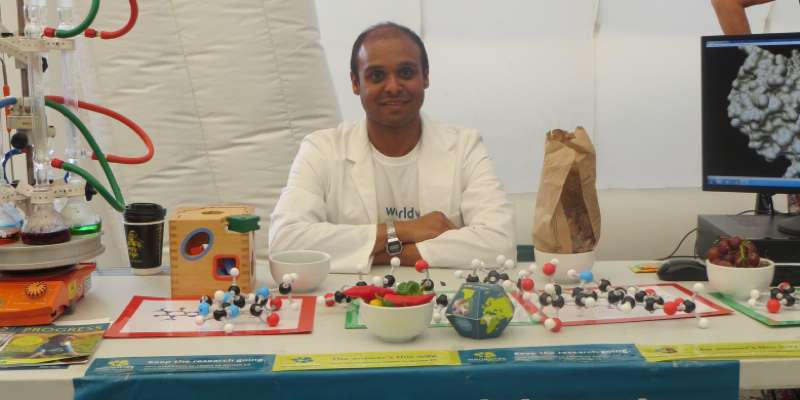Recent evidence in lab based tests has shown that, capsaicin, (one of the main molecules found in chillies responsible for providing their fiery hot taste), may have anti-cancer properties.
Although Dr Amit Nathubhai, a postdoctoral researcher funded by Worldwide Cancer Research at the University of Bath does not directly work on capsaicin, he didn't let that stand in the way of him promoting his research and the charity to the 2000 people at last weekend's Bath Chilli Festival.
Dr Nathubhai used capsaicin and other molecules found from natural sources, to demonstrate methods used towards the design and preparation of molecules that have the potential to be new drugs.
A keen advocate of public engagement with science, Dr Nathubhai told us "I wanted to excite the public and show them how we design and make vital molecules using examples from nature. Computer visuals, molecular modelling kits, science equipment and toys were used to engage the public and highlight the processes behind medicinal chemistry."
The public were fascinated and in most cases, for the first time, appreciated the methods used in medicinal chemistry research. There was great interest with the equipment used in organic chemistry and people were very keen to learn more about the work that Worldwide Cancer Research support.
He added us "I hope that I managed to educate the general public, inspire future generations towards science and increase the awareness of Worldwide Cancer Research".
Dr Nathubhai is currently working in the lab of Professor Mike Threadgill to design anticancer drugs.
Professor Threadgill told us "I've been researching new cancer drug treatments for over twenty years and Worldwide Cancer Research has funded a lot of this work. Just recently, we have had two projects which are showing promise; one in stopping cancer cells dividing, the other in prostate cancer. Support from Worldwide Cancer Research has been key in both discoveries."
Dr Nathubhai also let us have a sneak peek into a day in his lab in a previous blog post.
This isn't the first time that he has gone beyond the call of duty, as Dr Nathubhai and Professor Threadgill both took part in a 200ft charity abseil from Avon Gorge this summer to raise money for Worldwide Cancer Research.
More information: "Capsaicin reduces the metastatic burden in the transgenic adenocarcinoma of the mouse prostate model." Prostate, 75: 1300–1311. doi: 10.1002/pros.23013
Journal information: The Prostate
Provided by University of Bath























